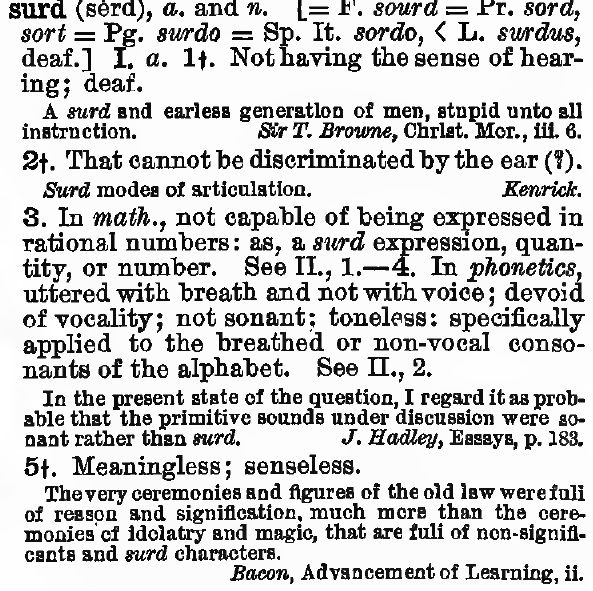Let us swop hats and excheck a few strong verbs weak oach eather yapyazzard abast the blooty creeks.
— FW 16
Thus begins the conversation between Mutt and Jute in the early pages of Finnegans Wake. It continues rather like a dialogue of the deaf:
Jute.— Yutah!
Mutt.— Mukk’s pleasurad.
Jute.— Are you jeff?
Mutt.— Somehards.
Jute.— But you are not jeffmute?
Mutt.— Noho. Only an utterer.
Jute.— Whoa? Whoat is the mutter with you?
Mutt.— I became a stun a stummer.
Jute.— What a hauhauhauhaudibble thing, to be cause! How, Mutt?
Mutt.— Aput the buttle, surd.
That last word is not often heard in everyday English, but it suits the story here, as the primal meaning of its Latin root surdus is “deaf.” But then the notion of “hard of hearing” slips over (by way of stuttering, stammering and muttering) into “hard to hear,” and thence to “unintelligible” or “irrational,” and thence to “meaningless.” This diversity was documented by C.S. Peirce in the Century Dictionary:

In his later work on logic as ‘the Basis of Pragmatism,’ Peirce used the word as a technical term applied to ‘the relation implied in duality,’ which ‘is essentially and purely a dyadic relation’ (EP2:382). A surd relation is the opposite of a dicible one. In less Latinate diction, you could say that a surd relation is “unsayable,” or perhaps “unreasonable.” It can be experienced but not really described.
For the only kind of relation which could be veritably described to a person who had no experience of it is a relation of reason. A relation of reason is not purely dyadic: it is a relation through a sign: that is why it is dicible. Consequently the relation involved in duality is not dicible, but surd …
EP2:382-3
Since all reasoning is in signs, a ‘relation of reason’ is triadic even if it seems to have only two correlates, two ‘subjects’ (like Mutt and Jute). It lacks the surdity of a ‘purely dyadic relation.’ But the only way our two ‘jeffmutes’ could enter into a purely dyadic relation would be to collide with each other, perhaps in a head-butting battle. The duality of their duel is clear enough ‘aput the buttle,’ but they do manage to swop hats and excheck a few verbs, thus making their relationship more triadic. If they both sound a bit “stunned,” maybe that’s just the effect of taking turns at the bottle.
Turning to genuine triadic relations, and thus to signs, we find that the Secondness of the dynamic relation between Sign and Object – or in communication, the duality between Utterer and Interpreter – must also be genuine, must be a ‘real’ relation, not a ‘relation of reason.’ As explained elsewhere, the element of Secondness or surdity must be involved in any honest attempt to understand, speak or hear the truth.
This may sound unsound or even absurd, but it is borne out by the twisted history of words themselves. If our language were entirely rational, for instance, the word absurd would mean “far from surd,” just as abnormal means “far from normal.” But in fact surd and absurd mean pretty much the same thing. Why? It’s hard to say, surd.
As Peirce remarked in the Century Dictionary, absurd is ‘a word of disputed origin’ – there is no dispute about what it actually means in everyday discourse, but a reasonable account of how it came to mean that has to choose between two possible significations of the prefix ab-. If it means “away from” (as in “absent” or “abnormal”), then combining it with the Latin root surd could not generate the usual meaning of absurd. Some say that the -surd part might come from a Sanskrit root that sounds similar but means “sound” (rather than “deaf”). Then absurd could have meant something like “inharmonious,” and thence “unsound” in the sense of “unreasonable.” The other side in the dispute say that the Latin and English surd is the root, but the prefix ab- acts as an ‘intensive’ rather than a negative (as it seems to do in “aboriginal”), thus making absurdity even more unreasonable or nonsensical than surdity.
The point is that, whether we can explain it or not, the common sense of the word absurd is “contrary to common sense” (CD), because that is how people actually use it. Likewise actual facts, no matter how well known, always carry a residue of unspeakable or inexplicable surdity. ‘Facts don’t do what I want them to,’ as Byrne and Eno put it. The element of Secondness in them keeps our knowledge real and our quest for Truth honest.